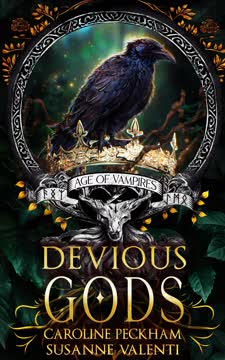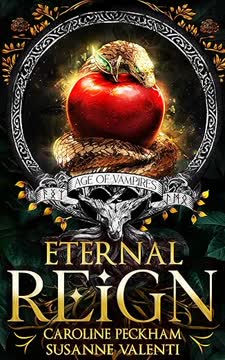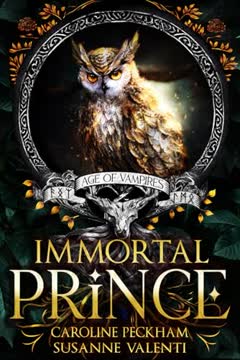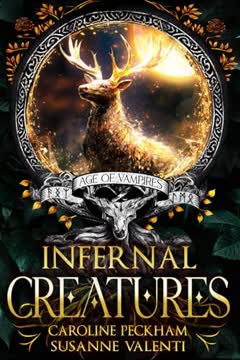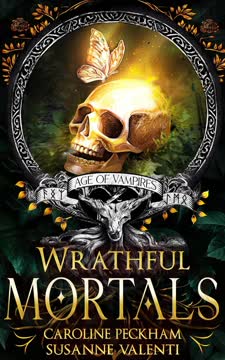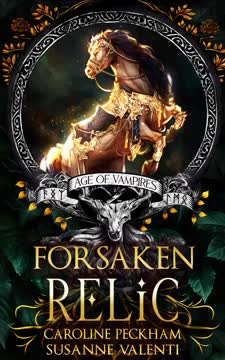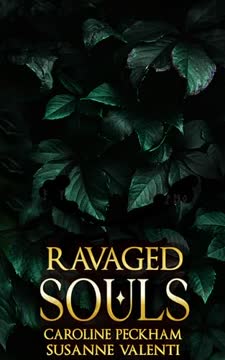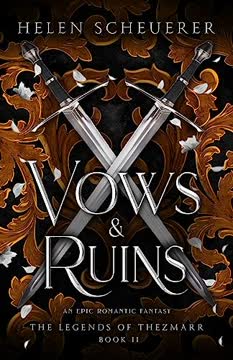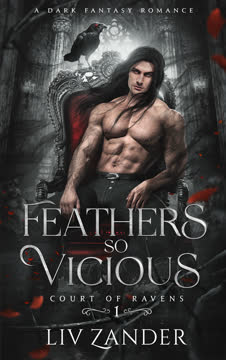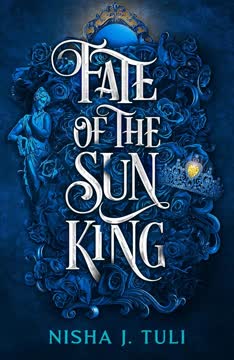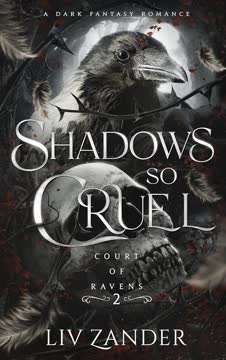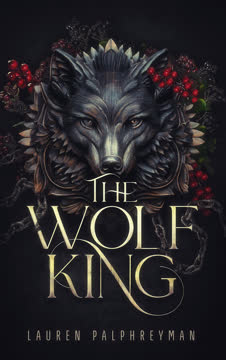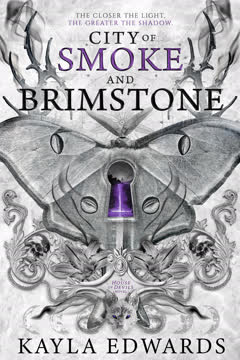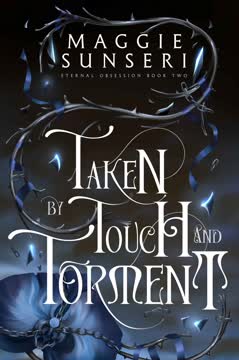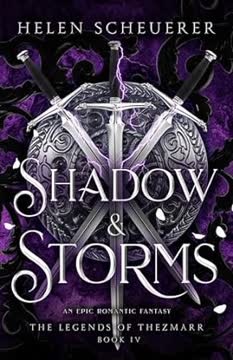Plot Summary
Blood and Betrayal
The story opens in the aftermath of a devastating battle. Magnar, once a slayer of vampires, awakens to find himself transformed into the very creature he despised. His beloved Callie stands by him, torn between hope and horror as he resists the bloodlust threatening to consume him. The group reels from loss—friends dead, trust shattered, and the goddess Idun's final act of vengeance leaving them fractured. As Magnar's new nature threatens the fragile unity of slayers and vampires, Callie's faith in him is tested. The group must decide whether to trust Magnar or fear him, as the boundaries between love and monstrosity blur. The emotional stakes are set: survival, loyalty, and the cost of transformation.
The Curse Reversed
With the prophecy hinting at a cure, the group embarks on a perilous trek to the holy mountain, the only hope of reversing the vampire curse. Magnar's refusal to feed puts everyone at risk, his willpower fraying as the thirst grows. Callie and her sister Montana, both marked by loss and love, struggle to keep the group together. The journey is fraught with danger—Familiars hunt them, supplies dwindle, and grief festers. The mountain looms as both salvation and threat, its promise of healing shadowed by the price it may demand. The group's unity is tested as old wounds and new hungers threaten to tear them apart.
Mortal Hearts, Immortal Wounds
The emotional toll of their journey deepens. Erik, Montana's husband, is paralyzed by guilt over the deaths of his brother and friend, pushing Montana away as he drowns in self-recrimination. The vampires' hunger grows unbearable, and the slayers' blood becomes both a necessity and a source of shame. Callie and Magnar's love is strained by his monstrous urges, while Montana and Erik's marriage teeters on the edge. The group's survival depends on their ability to forgive, trust, and accept the darkness within themselves and each other. The wounds of the past bleed into the present, threatening to destroy their future.
The Price of Vengeance
As the group's supplies run out, the vampires' hunger becomes a ticking time bomb. Forced to drink from the slayers, old resentments flare—Fabian, once Callie's captor, now begs for her blood, while Magnar's possessiveness grows feral. The group is ambushed by rebel vampires, and a brutal battle ensues. Erik discovers new powers, a legacy of the goddess's blood, but the cost is high. The line between friend and foe blurs as survival demands impossible choices. The price of vengeance is steep, and the group is forced to confront what they are willing to sacrifice for freedom.
Sisters of Sun and Moon
Callie and Montana's relationship anchors the narrative. Their shared history—growing up in the human Realms, surviving captivity, and loving men once their enemies—shapes their choices. As the prophecy unfolds, it becomes clear that their fates are intertwined: "Twins of sun and moon will rise, when one has lived a thousand lives." Their love for each other, and their willingness to sacrifice everything, becomes the key to breaking the curse. The sisters' journey is one of forgiveness, resilience, and the power of chosen family.
The Mountain's Call
The group finally reaches the holy mountain, battered and exhausted. The mountain's magic pulses with destiny, drawing Callie and Montana forward. The prophecy demands a price, and the sisters are forced to confront the reality that breaking the curse may require their lives. As the group battles Valentina and her army outside, the twins enter the mountain's heart, guided by visions and the power of their bond. The mountain becomes a crucible, testing their love, courage, and willingness to pay the ultimate price.
Hunger and Humanity
The vampires' hunger becomes unbearable, and the slayers' blood is the only thing keeping them sane. Callie and Julius, the last slayers, are forced to bleed for their friends, blurring the line between victim and savior. The act of feeding becomes intimate, shameful, and necessary—a metaphor for the ways trauma binds and divides them. Magnar's struggle to resist feeding from Callie mirrors the group's struggle to hold onto their humanity in the face of monstrous need. The question of what makes someone human—choice, love, sacrifice—echoes through every interaction.
The Battle for Control
As the group nears the mountain, old rivalries resurface. Magnar and Fabian clash over Callie, while Erik and Montana's marriage is tested by grief and guilt. The group is ambushed by rebel vampires, and a desperate battle for survival ensues. Erik's new powers—gifts from the goddess's blood—turn the tide, but at a cost. The group's unity is fragile, held together by love, necessity, and the hope of a future beyond the curse. The battle for control—of their bodies, their destinies, and their hearts—reaches a fever pitch.
Sacrifice in the Shadows
The group's journey through the mountain is marked by sacrifice. Callie and Montana are forced to confront the reality that breaking the curse may require their deaths. The group's love for each other—romantic, familial, and platonic—becomes both their greatest strength and their deepest vulnerability. As the prophecy's demands become clear, the sisters prepare to pay the ultimate price, trusting that their sacrifice will buy a future for those they love. The shadows of the past and the specter of death loom large, but hope endures.
The God's Bargain
At the mountain's heart, the twins confront Andvari, the god who holds the key to breaking the curse. He demands a terrible price: the souls of both sisters. The group's sacrifices, battles, and losses have led to this moment. Callie and Montana, bound by love and destiny, agree to the god's bargain, trusting that their deaths will save the world. As they step into the darkness, the group outside fights for their lives, unaware of the cost being paid within. The god's bargain is struck, and the world is forever changed.
Descent into Death
Callie and Montana's souls are devoured by Andvari, lost to all realms. Magnar and Erik, broken by grief, refuse to accept their loss. They journey into the afterlife, traversing the Hall of the Fallen and the eternal battlefield, seeking vengeance against the god who stole their loves. Along the way, they are reunited with lost friends and family, but the pain of loss drives them onward. The descent into death becomes a journey of reckoning, love, and the refusal to let go.
The Hall of the Fallen
In Valhalla, Magnar and Erik are reunited with their fallen kin, but the absence of Callie and Montana is a wound that will not heal. The afterlife is a place of joy and revelry, but for the two men, it is a reminder of all they have lost. Their love for the twins transcends death, and they resolve to do the impossible: to hunt down Andvari and reclaim the souls of the women they love. The Hall of the Fallen becomes a staging ground for the final battle—a testament to the enduring power of love and memory.
The Devouring God
Magnar and Erik face Andvari in his domain, a god who devours souls to fuel his power. The battle is brutal, surreal, and deeply personal. Andvari's many forms—reflections of fear, guilt, and rage—test the men's resolve. With the help of legendary weapons and the strength of their love, they defeat the god, shattering his mirrors and releasing the souls he has consumed. In a moment of grace, Callie and Montana are reborn, their souls reforged from the union of sun and moon. The devouring god is destroyed, but the scars of loss remain.
Souls Reforged
The twins are restored to life, their souls forever changed by their ordeal. Magnar and Erik, having sacrificed their own lives to save them, are granted a second chance by Odin. The group is reunited, their bonds stronger for all they have endured. The curse is broken, the gods' debts paid, and the world is remade. The power of love—romantic, familial, and chosen—proves stronger than death, destiny, or divine will. The group emerges from the mountain, forever changed but finally free.
Return to the Living
The group returns to the mortal world, greeted as heroes. The vampire curse is lifted, the Realms are opened, and humanity is given a second chance. The survivors must learn to live again—building new lives, forging new families, and healing old wounds. Callie and Magnar, Montana and Erik, Julius and Clarice, Fabian and Chickoa—all find love and purpose in the world they have saved. The scars of the past remain, but hope blooms in the promise of a new dawn.
A New Dawn
The world is remade in the image of hope. The Realms are opened, the vampires are human once more, and the survivors work to build a better society. The twins become ambassadors, bridging the gap between former enemies. The group's children grow up free, unburdened by the sins of the past. The legacy of sacrifice, love, and resilience shapes the new world. The dawn is bright, but the memory of darkness ensures that the lessons of the past are never forgotten.
Home Beyond the Curse
Years pass, and the group finds peace in the lives they have built. Their children play together, the bonds of family and friendship enduring. The pain of loss is tempered by the joy of reunion, and the promise of a future unburdened by fear. The world is not perfect, but it is theirs—a home forged in the fires of sacrifice and the light of love. The curse is broken, but the ties that bind them remain unbreakable.
Legacies of Light and Dark
The story closes with the twins reflecting on all they have endured and all they have gained. The sun and the moon, light and dark, are forever in balance. The legacy of their choices—sacrifice, forgiveness, and the refusal to give up on love—shapes the world they leave behind. The gods may watch from afar, but the true power lies in the hearts of those who choose to love, to fight, and to hope. The dusk and dawn are endless, and the story of the sisters of sun and moon lives on.
Characters
Callie Ford
Callie is the embodiment of resilience and hope, a slayer born in captivity who becomes the linchpin of the group's survival. Her love for Magnar, a former enemy, is both her greatest strength and her deepest vulnerability. Callie's journey is one of self-discovery, forgiveness, and sacrifice—she is willing to give everything, even her life, to save those she loves. Her bond with her twin, Montana, is unbreakable, and together they fulfill the prophecy that ends the vampire curse. Callie's arc is defined by her refusal to give up on love, her courage in the face of darkness, and her ability to see humanity in even the most monstrous of beings.
Montana Ford
Montana is Callie's twin and emotional anchor, a survivor who finds strength in love and family. Her relationship with Erik, a vampire prince, is fraught with history and pain, but ultimately becomes a testament to the power of forgiveness and transformation. Montana's journey is marked by loss, grief, and the struggle to hold onto hope. She is the voice of reason, the healer, and the bridge between worlds. Her willingness to sacrifice herself for the greater good, and her unwavering support for her sister, make her the heart of the group. Montana's arc is one of healing, acceptance, and the quiet strength that endures when all else is lost.
Magnar Elioson
Magnar is a slayer turned vampire against his will, forced to confront everything he once hated. His love for Callie is fierce, possessive, and redemptive—she is his reason to resist the bloodlust and fight for humanity. Magnar's transformation is both physical and psychological; he must reconcile his identity as a slayer with his new nature as a vampire. His journey is one of self-forgiveness, loyalty, and the willingness to sacrifice everything for love. Magnar's arc is defined by his struggle to control his monstrous urges, his devotion to Callie, and his ultimate willingness to face death—and the gods themselves—for her.
Erik Belvedere
Erik is a vampire prince burdened by guilt, loss, and the weight of leadership. His marriage to Montana is tested by grief and the legacy of violence, but ultimately becomes a source of healing and hope. Erik's journey is one of redemption—he must learn to forgive himself, accept his humanity, and fight for a future beyond the curse. His new powers, a gift from the goddess's blood, make him both a weapon and a target. Erik's arc is defined by his struggle to balance power and vulnerability, his love for Montana, and his willingness to defy the gods for the sake of those he loves.
Julius Elioson
Julius is Magnar's brother and Callie's protector, a slayer whose loyalty is unwavering. He is the group's moral compass, willing to sacrifice himself for the greater good. Julius's relationship with Clarice, a vampire, challenges his beliefs and forces him to confront the possibility of love beyond hatred. His arc is one of growth, acceptance, and the realization that family is chosen as much as it is given. Julius's strength lies in his ability to forgive, to fight for what is right, and to support those he loves, even when it means letting them go.
Clarice Belvedere
Clarice is Erik's sister, a vampire who becomes a vital member of the group. Her relationship with Julius is a testament to the possibility of reconciliation between enemies. Clarice is pragmatic, resourceful, and fiercely protective of her family. Her journey is one of healing old wounds, embracing vulnerability, and finding love in unexpected places. Clarice's arc is defined by her ability to adapt, her loyalty to her siblings, and her willingness to fight for a future beyond the curse.
Fabian Belvedere
Fabian is a former tyrant seeking forgiveness for his past crimes. His unrequited love for Callie and his complicated relationship with Chickoa drive his quest for redemption. Fabian's arc is one of atonement, humility, and the struggle to find humanity after centuries of monstrosity. He is both a source of conflict and a symbol of the possibility of change. Fabian's journey is marked by loss, regret, and the hope of building a better world.
Chickoa
Chickoa is a thousand-year-old vampire who has seen the rise and fall of empires. Her wisdom, resilience, and compassion make her a stabilizing force within the group. Chickoa's relationship with Fabian is fraught with history and pain, but ultimately becomes a source of healing for them both. Her arc is one of survival, forgiveness, and the quiet strength that comes from enduring unimaginable loss.
Valentina Torbrook
Valentina is the primary antagonist, a vampire queen whose hunger for power and vengeance drives much of the conflict. She is both a symbol of the curse's cruelty and a cautionary tale about the cost of unchecked ambition. Valentina's arc is one of downfall—her defeat marks the end of the old order and the beginning of a new era.
Andvari
Andvari is the god who holds the key to breaking the curse, demanding the ultimate price from the twins. He is a shapeshifter, a devourer of souls, and the embodiment of the gods' indifference to mortal suffering. Andvari's defeat is both a personal and cosmic victory, marking the end of the curse and the possibility of a future shaped by love rather than fear.
Plot Devices
Prophecy and Destiny
The narrative is driven by a prophecy that foretells the rise of the twins of sun and moon, the breaking of the curse, and the price that must be paid. The prophecy serves as both guide and threat, shaping the characters' choices and forcing them to confront the possibility that their destinies are not their own. The tension between fate and free will is a central theme, explored through the characters' struggles to accept, defy, or fulfill the prophecy.
Transformation and Identity
The transformation of slayers into vampires—and vice versa—serves as a metaphor for trauma, forgiveness, and the possibility of change. The characters are forced to confront the darkness within themselves and each other, blurring the line between monster and human. The struggle to hold onto identity in the face of transformation is mirrored in the group's shifting alliances, betrayals, and acts of redemption.
Sacrifice and Resurrection
The narrative structure is built around cycles of sacrifice and resurrection. The twins' willingness to die for each other and for the world is mirrored in the men who love them, who journey into death to bring them back. The afterlife is depicted as both a place of reunion and a battleground, where love and memory are the only weapons against oblivion. The ultimate victory is not the defeat of evil, but the reclamation of hope, love, and the possibility of a future.
Duality and Balance
The motif of duality—sun and moon, life and death, love and hate—runs throughout the narrative. The twins embody this balance, their bond the key to breaking the curse. The story explores the necessity of both light and darkness, the ways in which love and loss, hope and despair, are intertwined. The resolution is not the triumph of one over the other, but the achievement of balance and the acceptance of both.
Found Family and Forgiveness
The group's survival depends on their ability to forgive, trust, and accept each other—despite history, betrayal, and pain. The theme of found family is central, as the characters build new bonds that transcend blood, species, and past enmity. The narrative structure uses alternating perspectives and intimate moments to deepen these connections, allowing the reader to experience the emotional arc of each character.
Symbolic Objects and Weapons
The story is rich with symbolic objects—Andvari's ring, the slayers' swords, the gods' weapons—that serve as both plot devices and metaphors. These artifacts are tied to prophecy, power, and the characters' identities. Their use in key moments—unlocking the mountain, defeating Andvari, sealing vows—underscores the themes of destiny, sacrifice, and the possibility of change.
Analysis
Devious Gods is a sweeping, emotionally charged conclusion to a saga about love, sacrifice, and the struggle for redemption in a world shaped by violence and fate. At its core, the novel interrogates what it means to be human: the capacity for forgiveness, the willingness to change, and the power of love to transcend even death. The narrative's structure—alternating between moments of intimate vulnerability and epic battles—mirrors the characters' internal journeys, as they confront the darkness within themselves and each other. The use of prophecy and divine intervention raises questions about free will, destiny, and the cost of freedom. The story's resolution, in which the twins' sacrifice breaks the curse and remakes the world, is both a triumph and a lament for all that has been lost. The lessons are clear: true power lies not in strength or immortality, but in the courage to love, to forgive, and to hope. The legacy of the sisters of sun and moon is one of balance—between light and dark, past and future, self and other. In the end, Devious Gods is a testament to the enduring power of chosen family, the necessity of sacrifice, and the belief that even in the face of overwhelming darkness, dawn will always come.
Last updated:
Review Summary
Devious Gods, the final book in the Age of Vampires series, receives mostly positive reviews. Readers praise the epic conclusion, character development, and satisfying ending. The book wraps up the twins' story with action, romance, and emotional moments. Some reviewers found the middle sections slow or repetitive. Overall, fans appreciate the authors' growth and creativity, comparing it favorably to their other works. The series is recommended for those who enjoy vampire fantasy with dystopian elements and multiple romantic storylines.
